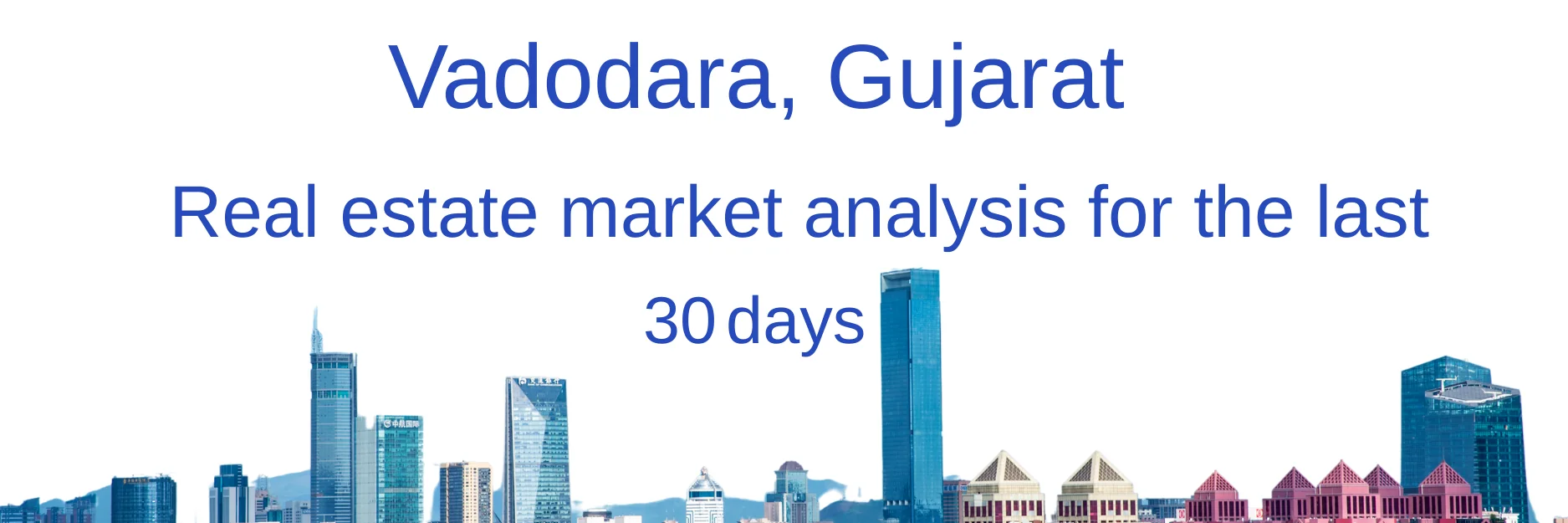Vadodara, Gujarat Real Estate Market Update (Apr 11, 2025 – May 11, 2025) [Updated on: May 2025]

Vadodara, commonly referred to as Baroda, in Gujarat is witnessing a dynamic phase in its real estate sector. Characterized by stable growth and steady demand, the city's real estate market over the past 30 days has shown promising prospects for both developers and buyers. This analysis delves into detailed insights derived from various aspects of Vadodara's real estate market, offering a comprehensive overview of current trends and future directions.
2. Market Gossip & Buzz
The latest buzz around Vadodara's real estate scene suggests a stable yet slow market characterized by gradual appreciation rather than erratic price spikes. This trajectory indicates an annual appreciation rate between 15% and 20%, driven by end-user demand rather than investor speculation. Developers seem to be adopting strategic pricing, seemingly cutting their profit margins to stay competitive amid rising land costs and premiums. The city’s comparison to its neighboring city Anand, thriving due to NRI and educational investment, suggests potential similar patterns in Vadodara.
3. New Projects Launched
Several notable projects have marked the past month in Vadodara. In the luxury segment, Galaxy Bougainvillea in Bhayli offers eight luxurious bungalows priced around ₹1.5 to 2 crore each, with large open gardens embracing exclusivity. EKG Platinum in Ankhol caters to upper-middle-class buyers with its triplex apartments, focusing on spacious designs and three-sided open spaces. Such developments reflect the evolving preferences of Vadodara's affluent residential clientele.
4. Upcoming Projects
Going forward, Vadodara has its sights set on a mix of luxury and affordability. Galaxy Group is expanding with a 4BHK bungalow project in Bhayli aimed at the premium segment. Meanwhile, affordable housing initiatives are underway in East Vadodara, near the Waghodia Road industrial belt, targeting migratory industrial workers. These projects strive to balance the city’s real estate offering across various economic brackets.
5. Price Changes in Existing Projects & Localities
Localities within Vadodara have experienced notable price surges, particularly in prime areas like Bhayli, Gotri, and Sevasi, where land prices have escalated due to improved expressway connectivity, soaring from ₹2,500-3,000 per sq. ft. to ₹5,000 per sq. ft. In the western part of Vadodara, a steady appreciation rate of 20-25% over the past few years has seen bungalow prices increase dramatically post-COVID, with properties climbing from ₹50 lakhs to ₹1 crore.
6. Infrastructure Developments
Infrastructure improvements significantly propel Vadodara's real estate growth. The Delhi-Mumbai Expressway and a new 75-meter ring road are notable projects enhancing connectivity and reducing travel times to key industrial zones, especially boosting Bhayli and Sevasi. Additionally, VMC’s expansion into areas like Ankhol, now equipped with essential utilities, makes them increasingly attractive to developers and investors.
7. Government Policies & Regulations
Recent policy changes such as the Jantri valuation adjustment, which has increased premiums on Floor Space Index (FSI) by up to 40%, could potentially raise development costs. This hike might be transferred to the end-user prices unless rationalization measures are applied. Unlike the practices observed in Ahmedabad, Vadodara mandates 100% clear titles for transactions, promoting transparency and buyer confidence under Gujarat RERA’s regulations.
8. Builder & Developer News
Prominent builders, including Galaxy Group, are actively focusing on expanding their footprint both within Vadodara and in nearby cities like Ahmedabad. Their strategic collaborations with local landowners on flexible payment terms—typically involving a 25–30% upfront commitment—indicate a collaborative approach to address the challenges imposed by high land costs.
9. Housing Trends (Luxury vs. Affordable)
Vadodara's real estate market exhibits a dual trend: a high demand for luxury 3–4 BHK bungalows in Bhayli and Gotri, attracting NRIs and retirees, contrasts with the affordability theme in East Vadodara. Here, 2BHK apartments priced at ₹25–30 lakhs cater to industrial workers with EMI costs aligning closely with typical rental yields. These divergent trends address varied market segments, offering something for both high-end and budget-conscious buyers.
10. Market Overview & Comparisons
When compared to larger cities like Ahmedabad, Vadodara stands out for offering better rental yields, typically between 5-6%, and lower entry costs—significantly more accessible at ₹30 lakhs compared to Ahmedabad's ₹3 crore benchmarks. The local market's end-user focus ensures stability and steady growth, avoiding the volatility seen in investor-driven cities like Surat and Ahmedabad.
11. Expert Opinions & Market Predictions
Experts view Vadodara as a long-term safe bet for real estate investment with stable annual growth prospects of 10–15% CAGR. The emerging development of high-street retail hubs, especially in Bhayli and Sevasi, reflects the city’s promising commercial potential. Furthermore, digital advancements, such as AI and virtual tours, begin reshaping the real estate landscape, although traditional practices like physical property inspections remain pivotal. The continued strong interest from NRIs, particularly drawn by Vadodara's educational infrastructure and industrial corridors, further reinforces its potential.
12. Conclusion
In conclusion, Vadodara’s real estate market epitomizes a "slow and steady" ethos, offering a unique blend of affordability and growth stability. With significant infrastructure projects on the horizon and strategic developments in the pipeline, the city holds a hidden gem-like status, providing viable opportunities for both luxury and affordable segments. As developers balance West-side luxury with East-side economic housing, the future of Vadodara’s real estate continues to look promisingly robust.
Interested in buying a property?
Leave your details – we’ll call within 5 minutes.
Comments
No comments yet. Be the first!